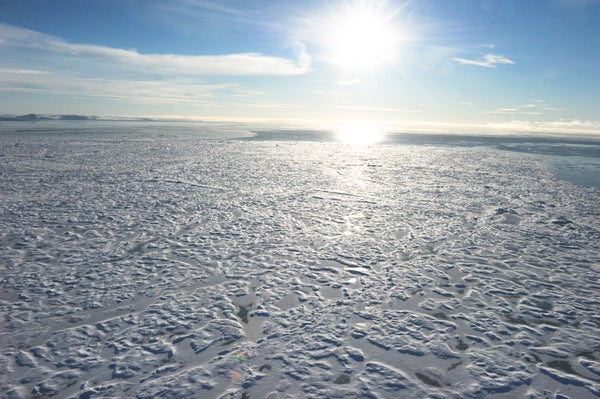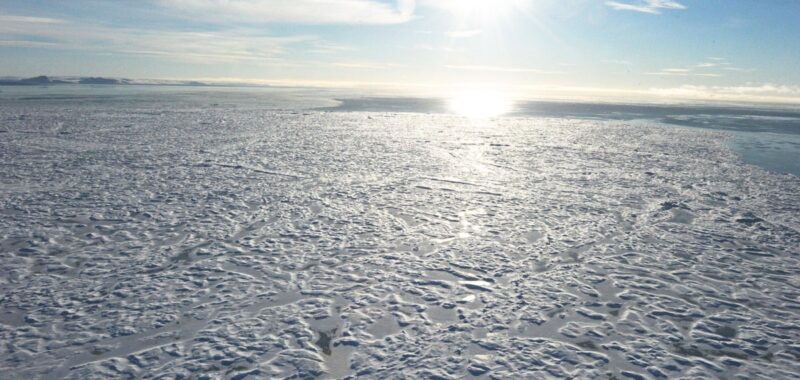U.K. Funds Geoengineering Experiments as Global Controversy Grows
Critics say U.K. investment in research on climate-cooling interventions, such as refreezing sea ice and brightening clouds, distracts from the need to cut planet-warming emissions

An aerial view of an ice floe near the CCGS Amundsen, a Canadian research ice-breaker navigating near an ice floe along Devon Island, in the Canadian High Arctic on September 27, 2025. The British government is funding a project to refreeze melting sea ice in the Canadian Arctic.
Clement Sabourin/AFP via Getty Images
CLIMATEWIRE | As temperatures fall and sunlight wanes this winter, scientists will gather in the Canadian Arctic with drills and pumps in tow. Their mission: to refreeze the region’s melting sea ice.
Known as Re-Thickening Arctic Sea Ice, or RASi, the project aims to pump seawater from the ocean and spray it over the top of existing ice floes, where the cold air will freeze it solid. Researchers hope that the process will create a thicker layer of sea ice, helping undo some of the damage caused by rising global temperatures.
For now, it’s just an experiment — and a relatively small one at that. Over the next three winter seasons, the researchers plan to refreeze areas as large as 1 square kilometer, or 0.38 square miles. Along the way, they’ll assess how the project affects the local ecology and the movement of the sea ice — and how long it takes to melt again in the summer.
On supporting science journalism
If you’re enjoying this article, consider supporting our award-winning journalism by subscribing. By purchasing a subscription you are helping to ensure the future of impactful stories about the discoveries and ideas shaping our world today.
The project is one of a handful of geoengineering experiments funded by the British government. UK’s Advanced Research and Invention Agency (ARIA) announced on Wednesday that it would invest a total of about $60 million in climate-cooling research, spread among 21 projects.
ARIA was established in 2023 to support a variety of research fields, from artificial intelligence to genetic engineering, but its investment in geoengineering studies counts as among its most controversial projects. The discourse has only grown more polarized as new research pushes once-futuristic techno-solutions into the realm of possibility.
Research advocates argue that the world is not reducing greenhouse gases fast enough to meet the Paris Agreement’s global climate goals. Cutting carbon emissions is still the most important way to address climate change — but as the planet heats up, they argue, scientists should understand the potential pros and cons of climate-cooling technology.
But critics worry that too much emphasis on geoengineering could distract world leaders from their efforts to phase out fossil fuels and reduce emissions.
Meanwhile, other recent geoengineering experiments have ended amid public criticism, including Harvard University’s SCoPEX experiment, a University of Washington cloud-brightening experiment and a sea ice-refreezing project conducted by an organization known as the Arctic Ice Project. An unauthorized experiment in 2022 by the startup Make Sunsets in Baja California, Mexico, resulted in a solar geoengineering ban from the Mexican government.
Meanwhile, the world’s largest geoengineering conference — the Degrees Global Forum — is set to begin in Cape Town, South Africa, next week.
Most of ARIA’s new projects involve computer modeling, climate monitoring or social questions related to governance and ethics surrounding geoengineering. Only five projects call for real-life outdoor experiments — but they’re easily the most expensive of all the research categories, totaling about $32 million in awarded funds. RASi received the most funding of all projects, at $13 million over the next 42 months.
Other experiments on the list include three projects aimed at brightening clouds to reflect more sunlight away from the Earth. A fifth experiment focuses on stratospheric aerosol injection, a strategy that would spray reflective particles into the atmosphere to directly beam sunlight back into space. The project would load up various kinds of mineral dust into weather balloons to test how they interact with the air at high altitudes without directly releasing them into the sky.
All outdoor experiments will undergo legal and environmental assessments in advance, said Mark Symes, an ARIA program director, in an email. And none of them will release toxic materials or deliberately set out to cool the climate, he said.
The announcement garnered both concern and support from organizations involved in global conversations around geoengineering.
“The UK Government risks triggering a costly, dangerous, and distracting race to develop technologies that should never be used,” said Mary Church, a geoengineering campaign manager with the nonprofit Center for International Environmental Law, in a statement. “Even experimenting with these technologies could further destabilise an already tense geopolitical context.”
The country should instead focus on phasing out fossil fuels, she added, suggesting that even small-scale experiments could become a “slippery slope” on the way to larger geoengineering deployments.
But Kelly Wanser, executive director of the nonprofit SilverLining, said in a statement that she was “heartened to see our friends at ARIA and the government in the UK recognize the need for responsible scientific research on potential interventions in the Earth system.” SilverLining advocates for geoengineering research.
Symes emphasized that cutting carbon emissions should remain the world’s priority when it comes to addressing climate change. Still, he added, more research is “essential” for informed global decision-making around potential climate interventions.
“ARIA’s programme is focused on generating fundamental scientific evidence about whether any proposed climate cooling approaches could ever be safe or feasible — or whether they should be ruled out entirely,” he said in an email.
Reprinted from E&E News with permission from POLITICO, LLC. Copyright 2025. E&E News provides essential news for energy and environment professionals.

